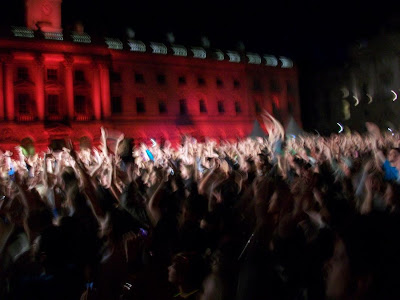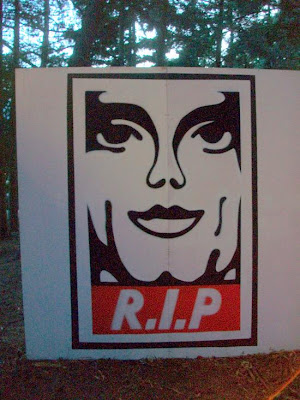40 years ago this month since the first human moon landing. The song that most resonates for me relating to this is Monochrome by The Sundays from their 1997 album
Static and Silence, if only because it perfectly mirrors my own experience - a small child and his sister woken up to watch the pictures beamed back from the moon:
"it’s 4 in the morning July in ‘69, me and my sister we crept down like shadows, they’re bringing the moon right down to our sitting room, static and silence and a monochrome vision.. it’s history and we stayed awake all night and something is said and the whole room laughs aloud, me and my sister looking on like shadows, the end of an age as we watched them walk in a glow, lost in space, but I don’t know where it is, they’re dancing around, slow puppets silver ground".
There are other pieces of music associated with this episode. The BBC
apparently played David Bowie's doomed astronaut anthem Space Oddity during their moon landing coverage (must admit I always assumed that Bowie recorded this after the moon landing, but it seems it
prefigured it).
Pink Floyd meanwhile jammed live on BBC during the moon landing, according to Dave Gilmour 'They were broadcasting the moon landing and they thought that to provide a bit of a break they would show us jamming. It was only about five minutes long. The song was called
Moonhead - it's a nice, atmospheric, spacey, 12-bar blues'.
Post-acid house, samples from the Apollo 11 voyage have been widely used as a signifier of spaced out (inter)planetary humanism, for instance on
The Orb's Adventures Beyond the Ultraworld (1991). Then, rather incredibly, there's Apollo 11 astronaut Buzz Aldrin's recent rap track Rocket Experience ('I've been there, now it's your turn'):
Of course, Gil Scott Heron offered a contemporary critique of the prioritisation of Cold War space spectaculars at the expense of wider human needs with his
Whitey on the Moon: 'A rat done bit my sister Nell with Whitey on the moon, Her face and arms began to swell and Whitey's on the moon, I can't pay no doctor bills but Whitey's on the moon, Ten years from now I'll be payin' still while Whitey's on the moon'. While he was right on one level, I still hold on to the optimism of believing that the human adventure hasn't come to an end with MP3s and High-Definition TV.
I don't have much to add to a talk I gave on 23 April 2005 as part of the 'ART IS NOT TERRORISM' event at Confluences, Paris, a 'Benefit event for the defense of Steve Kurtz and the Critical Art Ensemble at the occasion of 10 years of the Association of Autonomous Astronauts'. The event also included films, music and contributions from Jason Skeet, Kodwo Eshun , Riccardo Balli, James Becht, Ewen Chardronnet, Claire Pentecost, Brian Holmes, Nicola Triscott, Anjali Sagar, Michel Valensi and others.
Nostalgia for the Future: The Darker the Night, the Brighter the Stars
Once upon a time, people believed in the future. When I was growing up in England in the 1970s, one of the most popular programmes on TV was called 'Tomorrow's World'. Every week scientists would talk about how new and wonderful inventions would make our life better. Sociologists talked of an impending leisure society, where our biggest problem would be what to do with all the spare time created by increasing automation.
Space was central to this sense of future possibility. In eight short years the human species went from Yuri Gagarin's first tentative journey beyond earth's atmosphere to landing on the moon in 1969. However much this achievement might have been framed in the politics of the Cold War it truly was a giant step forward for humankind.
This faith in the future was not confined to apologists for the existing order of things. In 1969 the Situationist International looked forward to the day when 'Humanity will enter into space to make the universe the playground of the last revolt: that which will go against the limitations imposed by nature' (1). Sun Ra proclaimed that 'Space is the Place' for all those who found earth boring and George Clinton invited 'Citizens of the Universe' to join the 'Partying on the Mothership' (2).
I was of the generation of small children woken up in the early hours to watch the first pictures beamed back from the moon. The TV shows and films of the period led us to believe that soon we would all be doing it. By 2001, according to Kubrick's film, humans would be reaching out to the absolute on the far side of the galaxy.
We were lied to. What really happened in 2001? Grey September, planes crashing into buildings followed by weapons targeted from Space on some of the world's poorest people. We are now living in 'a general global state of war that erodes the distinction between war and peace' (3). A new kind of war without temporal or spatial limits - a war waged everywhere and nowhere, anytime, any place.
What better weapon in this new kind of war than space-based systems with the whole world in their sights? In 'The coming of age of the flesh machine', the Critical Arts Ensemble describe the development of the sight machine as an element of the war machine. They write: 'Through the development of satellite-based imaging technologies, in combination with computer networks capable of sorting, storing, and retrieving vast amounts of visual information, a wholistic representation has been constructed of the social, political, economic, and geographical landscape(s) that allows for near-perfect surveillance of all areas, from the micro to the macro. Through such visualization techniques, any situation or population deemed unsuitable for perpetuating the war machine can be targeted for sacrifice or for containment' (4).
The United States Air Force has an Air Force Space Command with its own Strategic Master Plan setting out a 25 year plan to maintain US space superiority. It boasts that 'Recent conflicts in Afghanisatan and Iraq have clearly demonstrated the asymmetric advantage space brings to any fight, whether that fight is in the middle of the desert, isolated mountainous terrain, or a large metropolitan area' A frightening new military newspeak has developed - 'Space Force Application' (weapons in space deployed against terrestrial targets), 'Counterspace' (preventing enemies using space), 'Space Force Enhancement' (using space to support air, ground, and sea forces) and 'Full Spectrum Space Combat Command'.
The Plan proposes developing the 'capability to deliver attacks from space… Space force application systems would have the advantages of rapid global access and the ability to effectively bypass adversary systems' (5). The vision then is of an orbital killing platform, out of this world but able to strike at targets on its surface. Weapons that can be deployed at the push of a button without the pesky inteference of mutineers, strikers, war resisters and saboteurs.
The Plan also describes something called the 'Commanding the Future' initiative, established to implement all this. This is the official vision of the future in 2005. No more fairy stories of better days to come. Instead the future as an idea has been colonised by fear and pessimism. We are told that the future will be a more dangerous place, in which only the State can save us. Every repressive law is now justified in the name of protecting us from some terrible future eventuality. So we have the Patriot Act which has ensnared Steve Kurtz and many other innocents.
Opposition movements have also turned their face to the past. Previous radical movements populated the future with utopian visions of different possible worlds. Marx wrote of the 1848 events in France that 'The social revolution… cannot take its poetry from the past but only from the future' (6). Since the heyday of the space race and the defeat of the radical movements of the 60s and 70s there has been a lowering of horizons away from changing the world towards just stopping things getting worse - the buzz words always seem to be 'stop' and 'resist'. Elsewhere, social conservatism is on the march from religious fundamentalisms to endless retro fashions in music and clothes.
The Association of Autonomous Astronauts was partly an attempt to make good some of the unkept promises of our childhoods. Like the band Pulp we asked 'we were brought up on the Space Race, now they expect us to clean toilets. When you have seen how big the world is, how can you make do with this?' (7). We wanted to rediscover space as the site of new ways of living and being, relishing the eruption of the marvellous rather than smothering it in the commercial, state and military baggage dragged into space by the mainstream space programmes. To do so we created a speculative playground in which all manner of new possibilities could be explored - dancing, music, sex - in the context of the entirely feasible proposition of community based spaced exploration.
The questions posed by the AAA remain unanswered: 'What would it be like to step into space? Beyond earth's gravity, its economy, its laws, what wonders would we discover? What unknown pleasures would we stumble across on our trip to the stars?' (8).
For most of us, the AAA is now in the past, but it is also in the future. One of the ideas we toyed with was that the AAA was a revolutionary movement of the future operating in the present, maybe, like in the film Terminator, sent back into the past by future autonomous communities in space, to guarantee their eventual success.
The task remains of reclaiming the future as a place of expanded human subjectivity and social wealth, rather than as a repository for present day anxieties. If sometimes it feels that we are in dark times, we must remember that the darker the night, the brighter the stars.
Neil Starman
The Once and Future Disconaut Association of Autonomous Astronauts
Paris, April 2005
References:
1. Eduardo Rothe, The Conquest of Space in the Time of Power, Internationale Situationniste, no,12, (1969).
2. The reference here is to the Sun Ra tracks 'Space is the Place' and 'Outer Spaceways Incorporated' and to Parliament's 'Mothership Connection'.
3. Michael Hardt and Antonio Negri, Multitude: War and Democracy in the age of Empire (New York: Penguin, 2004).
4. Critical Arts Ensemble, Flesh Machine: cyborgs, designer babies and the new eugenic consciousness (New York: Autonomedia, 1998)
5.
Air Force Space Command, Strategic Master Plan FY06 and beyond (2003)
6. Karl Marx, The Eighteenth Brumaire of Napolean Bonaparte (1852)
7. Pulp, Glory Days, from the LP 'This is Hardcore', 1998.
8. Neil Disconaut, Mission Accomplished but the Beat Goes On: the Fantastic Voyage of the AAA, in See you in Space: the Fifth Annual Report of the Association of Autonomous Astronauts (London, 2000)
See also: This is how we walk on the moon




 Jambalaya
Jambalaya
















 Something that has been around for while is
Something that has been around for while is 



